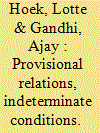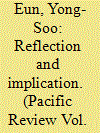| Srl | Item |
| 1 |
ID:
144359


|
|
|
|
|
| Summary/Abstract |
In the introduction to this special section, we present six ethnographic articles that explore the sites and forms of ‘non-sociological sociality’ in South Asia. Set in urban spaces where the familiar vectors of relations, such as ethnicity, class, gender or age, may be attenuated, the articles examine how social and political entanglement is suffused with ambiguity, indeterminacy, provisionality and contingency. In these sites, opaque conditions, open-ended play, double meanings and interpretive scrutiny abound. Spaces such as the racecourse, the bazaar, the university campus or the nocturnal street suggest undetermined conditions and fleeting collaborations which have a wider bearing on cross-cutting forms of sociality in South Asia.
|
|
|
|
|
|
|
|
|
|
|
|
|
|
|
|
| 2 |
ID:
186122


|
|
|
|
|
| Summary/Abstract |
This article elaborates on the following two questions and their implications. First, how can we as analysts offer compelling explanations for weak states’ agency and behaviours in the current global political and economic environments marked by multiplicity and fluidity? Second, what are the major causal factors that enable or influence weak actors’ agency, and under what conditions is their agency facilitated or constrained? Although an extensive literature in the discipline of International Relations (IR) confirms that today’s world is highly complex and diverse in terms of who or what matters in global politics, the subject of weak states and their agency is still not adequately discussed. Furthermore, the issues of methodology and theorising for the subject remain uncharted territory. By reflecting upon the main arguments and empirical findings of our special issue, this concluding article makes a case for ‘open-ended’ analytic eclecticism as an alternative methodological/analytical scheme, and lays preliminary ground for theorising weak states’ agency in the changed and changing global environments in the twenty-first century.
|
|
|
|
|
|
|
|
|
|
|
|
|
|
|
|